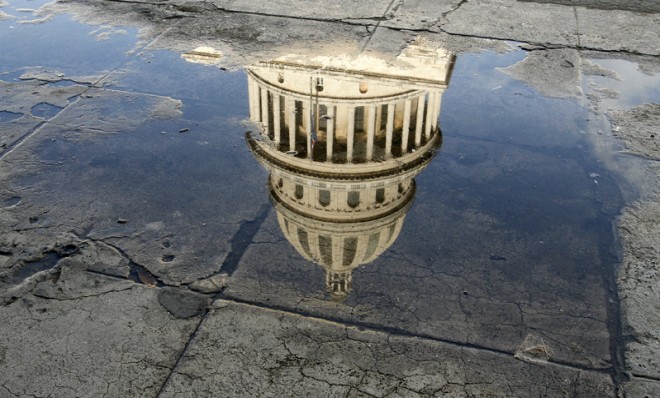Americans trust (almost) everything more than Congress
Gallup finds confidence in the legislature has slipped to an all-time low


Americans' confidence in Congress has fallen to an all-time low, according to a Gallup poll released Friday.
In the survey, only 10 percent of respondents said they had a "great deal" or "quite a lot" of confidence in the legislature, down from 13 percent the year before. It's also the lowest level Gallup has found since the firm began polling the question in 1973.
A 52 percent majority, meanwhile, said they had either "very little" or no confidence in Congress.
The Week
Escape your echo chamber. Get the facts behind the news, plus analysis from multiple perspectives.

Sign up for The Week's Free Newsletters
From our morning news briefing to a weekly Good News Newsletter, get the best of The Week delivered directly to your inbox.
From our morning news briefing to a weekly Good News Newsletter, get the best of The Week delivered directly to your inbox.
That measly showing put the legislature dead last on a list of 16 governmental and social institutions for the fourth year running.
Respondents had more confidence in big business (22 percent), banks (26 percent), and both TV news outlets and newspapers (23 percent each). And though polls have found Americans generally leery of the Affordable Care Act, Gallup found 19 percent of respondents had a lot of confidence in HMOs, while 35 percent had confidence in the medical system as a whole.
What's more, Americans' low level of confidence in Congress was the worst Gallup had ever found for any institution.
That finding complements other recent surveys that have pegged Congress' approval rating in the low teens. A Public Policy Polling survey from January determined Congress was less popular than cockroaches, Nickelback, carnies, traffic jams, and Donald Trump. Congress did, however, beat out Lindsay Lohan in that poll.
A free daily email with the biggest news stories of the day – and the best features from TheWeek.com
The primary cause for Congress' dismal approval rating: Partisan bickering and legislative gridlock. According to another recent Gallup survey, six in ten Americans who disapproved of Congress cited that body's ineffectiveness as the main reason they gave it low marks.
Though Americans have been down on Congress as a whole, they've generally felt good about their individual representatives. That helps explain the high incumbency rate; in the last election, 90 percent of incumbents won reelection. Ironically enough, it also explains continued gridlock. As the old adage goes, in a democracy you get the government you deserve.
Jon Terbush is an associate editor at TheWeek.com covering politics, sports, and other things he finds interesting. He has previously written for Talking Points Memo, Raw Story, and Business Insider.
-
 Grok in the crosshairs as EU launches deepfake porn probe
Grok in the crosshairs as EU launches deepfake porn probeIN THE SPOTLIGHT The European Union has officially begun investigating Elon Musk’s proprietary AI, as regulators zero in on Grok’s porn problem and its impact continent-wide
-
 ‘But being a “hot” country does not make you a good country’
‘But being a “hot” country does not make you a good country’Instant Opinion Opinion, comment and editorials of the day
-
 Why have homicide rates reportedly plummeted in the last year?
Why have homicide rates reportedly plummeted in the last year?Today’s Big Question There could be more to the story than politics
-
 The billionaires’ wealth tax: a catastrophe for California?
The billionaires’ wealth tax: a catastrophe for California?Talking Point Peter Thiel and Larry Page preparing to change state residency
-
 Bari Weiss’ ‘60 Minutes’ scandal is about more than one report
Bari Weiss’ ‘60 Minutes’ scandal is about more than one reportIN THE SPOTLIGHT By blocking an approved segment on a controversial prison holding US deportees in El Salvador, the editor-in-chief of CBS News has become the main story
-
 Has Zohran Mamdani shown the Democrats how to win again?
Has Zohran Mamdani shown the Democrats how to win again?Today’s Big Question New York City mayoral election touted as victory for left-wing populists but moderate centrist wins elsewhere present more complex path for Democratic Party
-
 Millions turn out for anti-Trump ‘No Kings’ rallies
Millions turn out for anti-Trump ‘No Kings’ ralliesSpeed Read An estimated 7 million people participated, 2 million more than at the first ‘No Kings’ protest in June
-
 Ghislaine Maxwell: angling for a Trump pardon
Ghislaine Maxwell: angling for a Trump pardonTalking Point Convicted sex trafficker's testimony could shed new light on president's links to Jeffrey Epstein
-
 The last words and final moments of 40 presidents
The last words and final moments of 40 presidentsThe Explainer Some are eloquent quotes worthy of the holders of the highest office in the nation, and others... aren't
-
 The JFK files: the truth at last?
The JFK files: the truth at last?In The Spotlight More than 64,000 previously classified documents relating the 1963 assassination of John F. Kennedy have been released by the Trump administration
-
 'Seriously, not literally': how should the world take Donald Trump?
'Seriously, not literally': how should the world take Donald Trump?Today's big question White House rhetoric and reality look likely to become increasingly blurred
